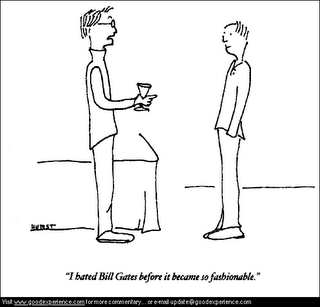
Unlawful monopolistic practices, an adapt and overwhelm (predatory) R&D strategy, and vendor lock-in tactics— criticism of software maker Microsoft (MSFT-$27.69) has followed the company's existence because of various aspects of its products and business practices. Yet, after reviewing Microsoft’s Proxy Statement filed with the SEC last week, the 10Q Detective found few irregularities that suggest—at least when it comes to the Company’s executive compensation policy—the software maker is less a golden cow being milked by insiders and more of a “velvet sweatshop.”
[Ed. note. The first instance of "velvet sweatshop" used in reference to Microsoft originated from a Seattle Times article in 1989,which disclosed allegations of the company working its employees to the point where it might be bad for their health.]
As disclosed in its fiscal year 2006 Proxy, the average salary for its top five executives was about $600,000 (and between $350,000 and $500,000 in cash bonus). The compensation (salary plus cash bonuses) for Chairman Bill Gates and CEO Steve Ballmer were $966,667 and $966,667, respectively. Additionally, both men did not receive any long-term compensation (Restricted Stock Units and/or Stock Options).
Their salaries and total compensation are significantly below competitive levels for the information technology industry and large market capitalization U.S. companies. Additionally, Microsoft does not grant regular stock awards to its most senior executives (approximately 15 individuals) and (aside from the Company’s 401(k) Plan and welfare benefit programs) there is no other Company-sponsored retirement program (like a Supplemental Executive Retirement Plan).
COMPANY | POSITION | NAME | SALARY | EXERCISED |
Advanced Micro | CEO | Hector de J. Ruiz | $4.95 Mil. | $3.13 Mil. |
Cisco Systems | CEO | John T. Chanbers | $1.65 Mil. | $61.33 Mil. |
EMC | CEO & Chairman | Joseph M. Tucci | $3.16 Mil. | 0 |
IBM | CEO & Chairman | Samuel J. Palmisano | $6.86 Mil. | $9.45 Mil. |
Intel | CEO | Paul S. Otellini | $3.29 Mil. | $5.36 Mil. |
Motorola | CEO & Chairman | Edward J. Zander | $4.50 Mil. | 0 |
Oracle | CEO | Lawrence J. Ellison | $7.48 Mil. | $66.89 Mil. |
Sun | Chairman | Scott G. McNealy | $1.23 Mil. | $11.84 Mil. |
In comparison, the average CEO salary and bonus for the aforementioned high-profile group was $4.14 million in base salary (and bonus) and $19.75 million in exercised stock options.
The Compensation Committee took into account the status of Messrs. Ballmer and Gates as significant shareholders of the Company when calculating their annual incomes. Gates and Ballmer, beneficially own 957.5 million shares and 408.3 million shares, worth an estimated $26.5 billion and $11.3 billion, respectively. We laud the philosophy of the Committee: “As the leaders of the Company, they are focused on building long-term success, and as significant shareholders in the Company, their personal wealth is tied directly to sustained increases in the Company’s value.” This principle is exposited by many a Compensation Committee—but rarely displayed in practice.
The 10Q Detective could detect few corporate governance offenses in Microsoft’s Proxy Statement. The only conflict worth noting is that Messer. Gates is the sole shareholder of Corbis Corporation, a company that provides digitized images and production services. Microsoft paid Corbis approximately $860,000 in fiscal year 2006 as licensing fees for digital images to be used in Microsoft’s products, services, and marketing materials. We doubt, however, that this business is material to Gates, for he is worth an estimated $53 billion outright.
Labor practices, high-profile Internet-related product security lapses, and usability issues—just another three in a litany of business abuse practices spewed at Microsoft. An "evil empire" to its critics, but less than so when it comes to executive pay practices.
Editor David J Phillips has no financial interest in any companies mentioned in this posting. The 10Q Detective has a full disclosure policy.
Their present executive compensation does not appear excessive but, I wonder, how did Steve Ballmer get 408.3 million shares? Did he spend his own cash to acquire?
ReplyDelete